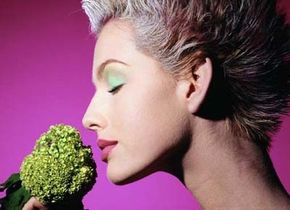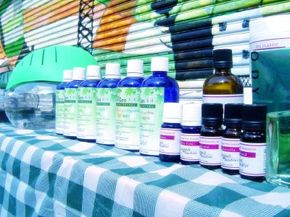In order to be an educated consumer and purchase good quality essential oils for aromatherapy, you need to understand how an essential oil is extracted from the plant as well as what differentiates a good quality essential oil from a poor quality one. You can't tell just by looking. But using a high quality oil is essential to achieving maximum healing benefits from your aromatherapy treatments. And, in the long run, buying high quality oils will be easier on your pocketbook, too.
In this article, we tell you everything you need to know about essential oils so that you can understand exactly what you are looking at during your next shopping trip for aromatherapy supplies. We'll begin on the next page by showing you how essential oils are made.
Advertisement
To learn more about Aromatherapy and other alternative medicines, see:
- Aromatherapy: Here you will learn about aromatherapy, how it works, what part essential oils play, and how to use aromatherapy.
- Essential Oils Profiles: We have collected profiles of dozens of plants that are used to produce essential oils. On these pages, you will learn the properties and preparations for the most popular essential oils, whether you are using them directly or using an oil diffuser.
- How to Treat Common Conditions With Aromatherapy: Aromatherapy can be used to treat a number of conditions, from asthma to depression to skin problems. Here you will learn how to treat some common medical problems with aromatherapy.
- Home Remedies: We have gathered over a hundred safe, time-tested home remedies for treating a wide variety of medical complaints yourself.
- Herbal Remedies: Herbal remedies and aromatherapy can be very similar, and they stem from similar historic roots. On this page, you will find all of our herb profiles and instructions for treating medical problems with herbal remedies.
This information is solely for informational purposes. IT IS NOT INTENDED TO PROVIDE MEDICAL ADVICE. Neither the Editors of Consumer Guide (R), Publications International, Ltd., the author nor publisher take responsibility for any possible consequences from any treatment, procedure, exercise, dietary modification, action or application of medication which results from reading or following the information contained in this information. The publication of this information does not constitute the practice of medicine, and this information does not replace the advice of your physician or other health care provider. Before undertaking any course of treatment, the reader must seek the advice of their physician or other health care provider.This information is solely for informational purposes. IT IS NOT INTENDED TO PROVIDE MEDICAL ADVICE. Neither the Editors of Consumer Guide (R), Publications International, Ltd., the author nor publisher take responsibility for any possible consequences from any treatment, procedure, exercise, dietary modification, action or application of medication which results from reading or following the information contained in this information. The publication of this information does not constitute the practice of medicine, and this information does not replace the advice of your physician or other health care provider. Before undertaking any course of treatment, the reader must seek the advice of their physician or other health care provider.
Advertisement


